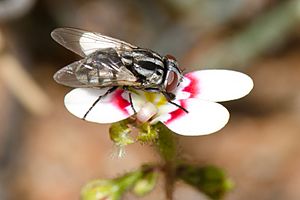Australian bush fly facts for kids
Quick facts for kids Australian bush fly |
|
|---|---|
 |
|
| An Australian bush fly on a flower | |
| Scientific classification | |
| Kingdom: | |
| Phylum: | |
| Class: | |
| Order: | |
| Family: |
Muscidae
|
| Subfamily: |
Muscinae
|
| Tribe: |
Muscini
|
| Genus: | |
| Species: |
M. vetustissima
|
| Binomial name | |
| Musca vetustissima Walker, 1849
|
|
The Musca vetustissima, commonly known as the Australian bush fly, is a very common type of fly found all over Australia. This fly is so common that it's the reason behind the funny expression "Aussie salute", which is when people wave their hands to shoo flies away from their faces!
Contents
Meet the Australian Bush Fly
The Australian bush fly is a type of dung fly. This means it likes to hang out around animal waste. It's a close relative of another fly called the bazaar fly. Adult bush flies are often found near large mammals. They look for liquids to drink and animal droppings to lay their eggs in.
What They Like to Do
These flies are attracted to certain smells. They especially like a mix that includes things like ammonium sulfate and anchovy meal. Scientists have even used special traps that face the wind to catch them.
Spreading Germs
Studies have shown that the Australian bush fly can carry and spread tiny bacteria and other germs. These germs can include things like Salmonella and Shigella, which can make people sick. Flies living on farms tend to carry more bacteria than those in cities.
Why They Bother Us
Bush flies love to crawl on human faces, especially around the eyes, nose, and mouth. They also like to land on livestock (farm animals). They are also attracted to human and animal waste.
Life Cycle of the Bush Fly
The Australian bush fly lays its eggs in large amounts of animal dung. The young flies, called larvae (or maggots), grow inside these dung pads. They have been found in the droppings of many large mammals.
Where They Live and Travel
In the warmer, subtropical parts of Australia, these flies breed all year round. When spring arrives, they travel to other parts of Australia. This helps new groups of flies spread across the country.
 | Audre Lorde |
 | John Berry Meachum |
 | Ferdinand Lee Barnett |

